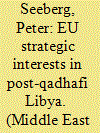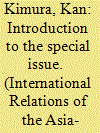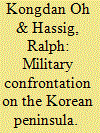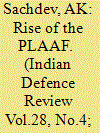| Srl | Item |
| 1 |
ID:
130939


|
|
|
|
|
| Publication |
2014.
|
| Summary/Abstract |
Since the fall of Muammar Qadhafi in 2011, a legitimate monopoly over the means of violence has not been in the hands of the Libyan state. The military confrontation between the regime and what the international media called the "rebels," supported by the NATO no-fly zone, ended in October 2011. However, in 2012 and especially in 2013, Libya witnessed an escalating conflict pitting the democratically elected government and the Libyan state against armed groups and militias. For the EU, this is a challenge to its strategic interests, primarily security in the Mediterranean and secondarily migration and the development of Libya.
|
|
|
|
|
|
|
|
|
|
|
|
|
|
|
|
| 2 |
ID:
131384


|
|
|
|
|
| Publication |
2014.
|
| Summary/Abstract |
In recent years, East Asian countries have faced serious challenges with regard to regional security. The bilateral relationships between China and Japan, and Japan and South Korea, have become increasingly strained due to a variety of disagreements over key political issues, such as territorial claims. Some observers argue that China and Japan may become involved in a direct military confrontation in the near future over the Senkaku/Diaoyu Islands. The increasing levels of naval and aerial engagements between the two countries demonstrate that such arguments can no longer be seen as 'out of the question'. While two democracies in the region, Japan and South Korea, are both major alliance partners with the United States and share the key security concern of countering North Korea's nuclear and conventional provocations, the two have suffered deteriorating relations since 2012. For instance, the General Security of Military Information Agreement, which provided a mechanism through which Japan and South Korea could share military technology, was canceled in July 2012. Furthermore, the two states have been embroiled in an increasingly antagonistic territorial dispute over Takeshima/Dokdo Islands since President Lee Myung-bak's visit to the islands in August 2012.
|
|
|
|
|
|
|
|
|
|
|
|
|
|
|
|
| 3 |
ID:
122024


|
|
|
| 4 |
ID:
057680


|
|
|
| 5 |
ID:
125369


|
|
|
|
|
| Publication |
2013.
|
| Summary/Abstract |
The 'inscrutable' sobriquet for the Chinese is not so much because of their unsmiling faces but on account of their unpredictable actions. Military action against India may not come in the form of a full-fledged war. Small pin pricks in 'disputed territories' may keep increasing in magnitude and frequency until even the submissive and cautious Indian government is constrained to react. Should that happen and a larger military confrontation become inevitable, the PLAAF would be a major instrument of damage to our forces, assets and national pride. Some writings on the 1962 conflict include views that the IAF could have done considerable damage to the Chinese as the PLAAF had outdated aircraft and equipment then. The same is not true about the PLAAF today. The continuing delays in updating capabilities of the IAF relentlessly bring us closer to the possibility of a humiliating experience at the hands of the PLAAF.
|
|
|
|
|
|
|
|
|
|
|
|
|
|
|
|
| 6 |
ID:
052651


|
|
|
|
|
| Publication |
Apr-Jun 2004.
|
|
|
|
|
|
|
|
|
|
|
|
|
|
|
|